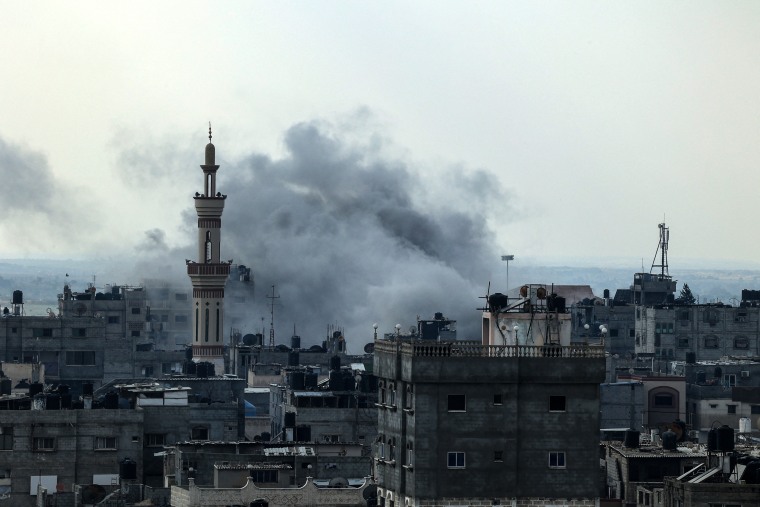In Orem, Utah, a couple dozen protesters stood on street corners outside McDonald’s and Burger King restaurants last Friday to call for a cease-fire and oppose U.S. and state leaders’ support for Israel, according to a local news report.
A few days earlier, pro-Palestinian protesters in Sydney plastered a McDonald’s with red paint and anti-Israeli stickers, according to Reuters.
Almost two months into the war between Israel and Hamas, protests targeting some companies that have been portrayed as having pro-Israel stances continue to percolate, with real-life incidents on opposite sides of the world connected by a steady drumbeat of social media calls to keep up the pressure.
Those calls have generally focused on two companies: McDonald’s and Starbucks. And though each company has sought to distance itself from the conflict and issued statements saying they don’t support or donate to Israel’s government or military, that has done little to quell boycott calls online.
Data made public by TikTok shows that the use of the hashtag “#boycottstarbucks” peaked in early November but remains elevated. It has been used on 7,000 TikTok videos in the United States during the past 30 days, with a combined 51 million views. The hashtag “#boycottmcdonalds” has followed a similar track, used on more than 3,000 TikTok videos with 10 million views in the same period. There are also many videos about the boycotts that don’t use the hashtags.
The popular refrain to boycott Starbucks and McDonald’s originated online, starting not long after the conflict itself. Tesneem, a Palestinian Canadian who has posted online about the situation in the impoverished and densely populated Gaza Strip for years, said she learned about the boycott efforts from social media.
“People were saying ‘We need to do targeted boycotts.’ And I was like ‘OK, that’s awesome, but what are we targeting?’” the 23-year-old, who spoke on the condition her last name be withheld over fears of professional repercussions, said in a phone interview.
Tesneem said boycott calls around Starbucks started after the company sued the Starbucks Workers United (SWU), a union with more than 360 participating stores and more than 9,000 employees (whom the company refers to as partners), after it made a post on its X account that said “Solidarity with Palestine” after the Hamas attack on Oct. 7. Previously, the Guardian reported that negative sentiment toward Starbucks was already brewing over its aggressive anti-union tactics, like shutting down unionized stores.
Workers United President Lynne Fox wrote in an op-ed that the tweet was written by one person, unauthorized by any other SWU members, and was quickly deleted. Starbucks ordered its employees’ union to stop using the Starbucks name and logo, and the SWU countersued for the right to continue using both. A representative for Starbucks pushed back on its lawsuit being about the one post, noting that it encompasses “a number of communications from Workers United and the subsequent confusion created by those communications,” including confusion from U.S. government officials.
Follow live updates on the Israel-Hamas war
Tesneem said boycotts of McDonald’s were triggered by news reports that a franchise owner in Israel said that its restaurants would be providing free meals to Israel Defense Forces soldiers and Israeli hospitals. Newsweek reported the Israeli franchise said five stores are in operation for this purpose alone, and more than 100,000 meals have been donated.
McDonald’s has worked to distance itself from that franchisee. In a statement, it said: “We are dismayed by the disinformation and inaccurate reports regarding our position in response to the conflict in the Middle East.”
“McDonald’s Corporation is not funding or supporting any governments involved in this conflict, and any actions from our local Developmental Licensee business partners were made independently without McDonald’s consent or approval,” the statement continued.
Since then, online boycott calls have coincided with some on-the-ground protests. Viral videos have purported to show protesters gathering outside McDonald’s stores in Lebanon and Turkey, as well as inside a McDonald’s in Melbourne, Australia. In mid-October, “#BoycottMcDonalds” trended on X.
The same month, dozens of Howard University students gathered outside a Starbucks in Washington, D.C., to write pro-Palestine messages in sidewalk chalk.
There’s little evidence to show that the boycotts will have a meaningful impact on the businesses of Starbucks or McDonald’s despite some viral claims to the contrary, such as a widely shared but unsubstantiated post on Instagram saying that the businesses’ sales have dropped. In Medan, Indonesia’s third-largest city, Al Jazeera reported Nov. 14 that workers at local McDonald’s and Starbucks locations noticed a sales dip amid boycotts in the country, but there has been little evidence of more widespread dips. Both companies have reported rising sales in their most recent earnings reports.
But some who have participated in the boycott calls say they see them as a long-term effort. One of the most-watched Starbucks boycott videos came from a barista who posted instructions on TikTok on how to make some of the chain’s most popular beverages. It has been viewed 9.3 million times. Starbucks has not commented on the video.
Wyenû, the barista — who lives in the U.S. — later quit but has continued to post about the conflict.
“I think this is more of a movement than a trend,” said Wyenû, who spoke on the condition their last name be withheld over fears of professional repercussions. “Social media trends peak and then they fall into obscurity, but movements go the other way around. They start out tiny, then they grow.”

